Static Big Bang Universe
Verfasst: Di 3. Dez 2024, 14:30

 This is the english version.
This is the english version.  Für die deutschsprachige Version geht es hier entlang.
Für die deutschsprachige Version geht es hier entlang. 

Critical value for the dark energy ΩΛ in a closed universe; a smaller value leads to a Big Crunch, the exact value brings the expansion to a halt and a larger value leads to eternal accelerated expansion since then the Hubbleparameter never reaches 0 but converges to a constant value:
Example: at In[1] we define the normalized Hubbleparameter H and the first and second time derivatives (ȧ and ä) of the normalized scalefactor as well as the relations between pressure, density and curvature. At In[5] the velocity and acceleration of the expansion are set to 0 to solve for the limit between expansion and contraction (all the other time derivatives of a also become 0 there). At In[6] we choose our values for the matter Ωm and radiation Ωr. At In/Out[8] we evaluate the required dark energy ΩΛ and the scalefactor a when the equilibrium occurs and plot the functions at Out[11]. The plot values right of the vertical gridline belong to such values of a which are reached at no predictable time t since at the maximal value of a, here a=4.33407, we get H=0 and dH/dt=0, which is an unstable equilibrium:
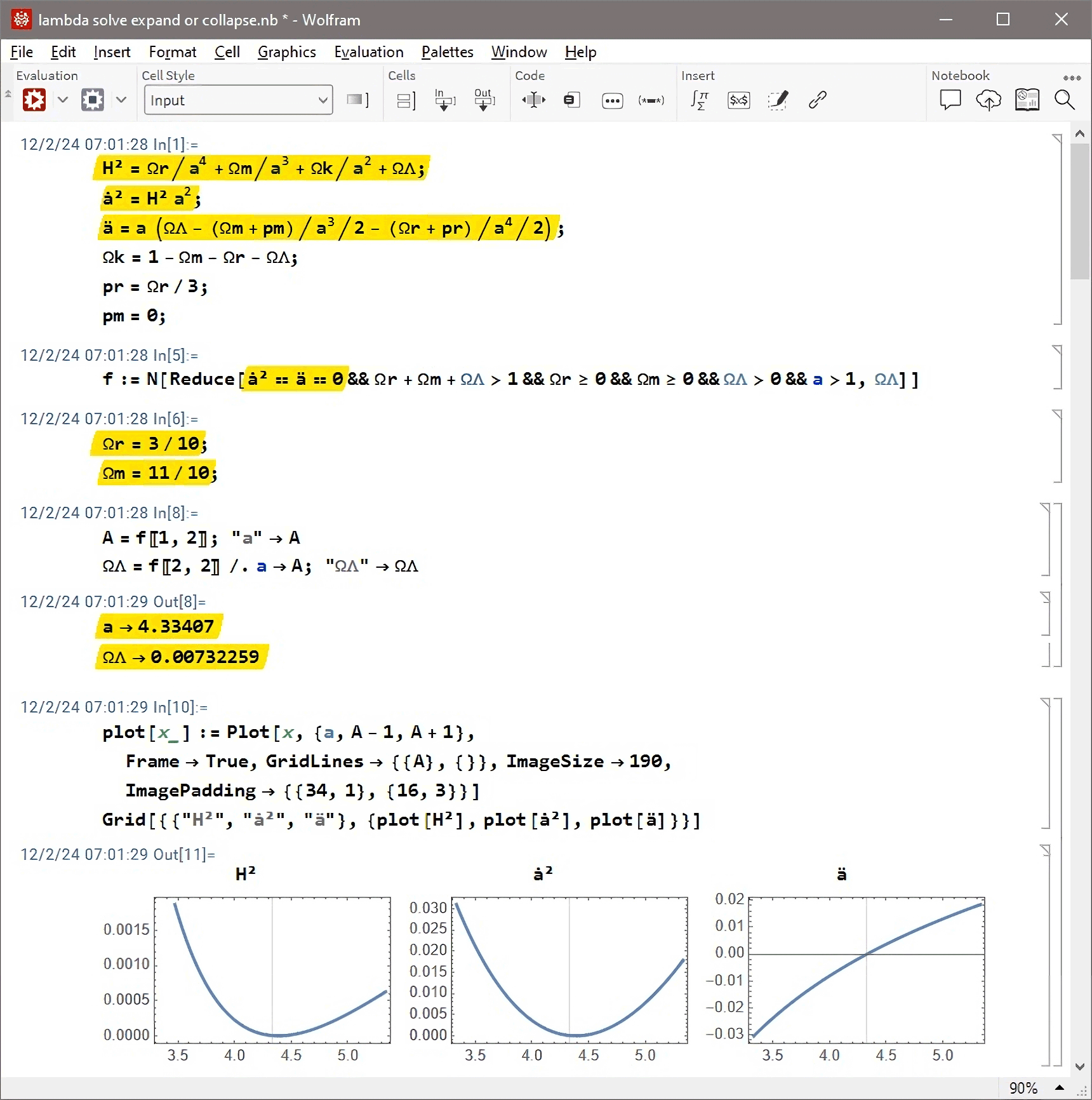
Spacetime diagrams of the universe above in proper distance r(t), comoving distance R(t) & conformal time R(η) coordinates. rH: Hubble radius (blue), rE: Event horizon (none), rP: Particle horizon (green), rM: Antipode πrK (purple), Orange curve: Past light cone, Dashed orange: Future light cone, Dashed gray: Comoving world lines, R=r/a:
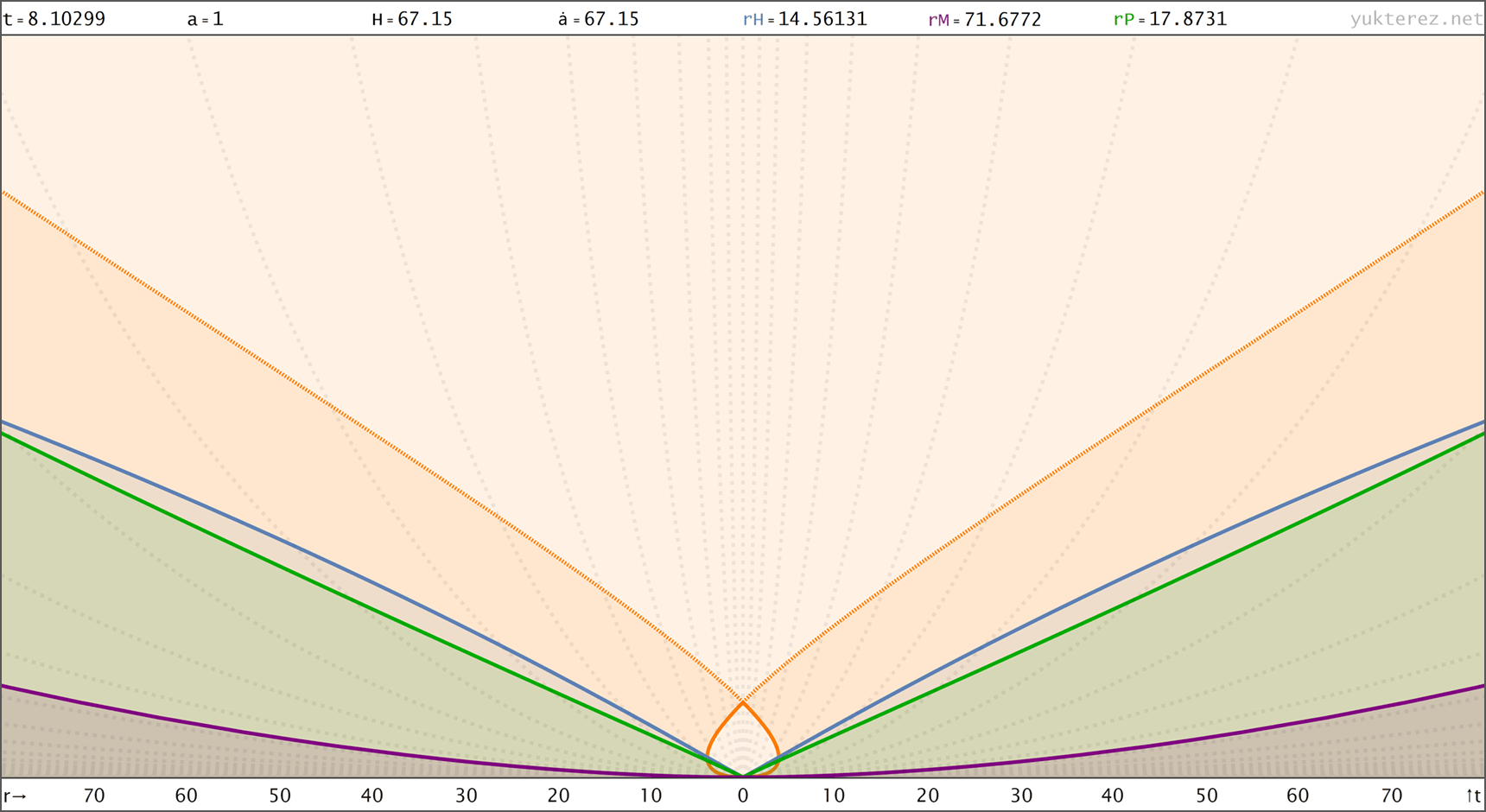
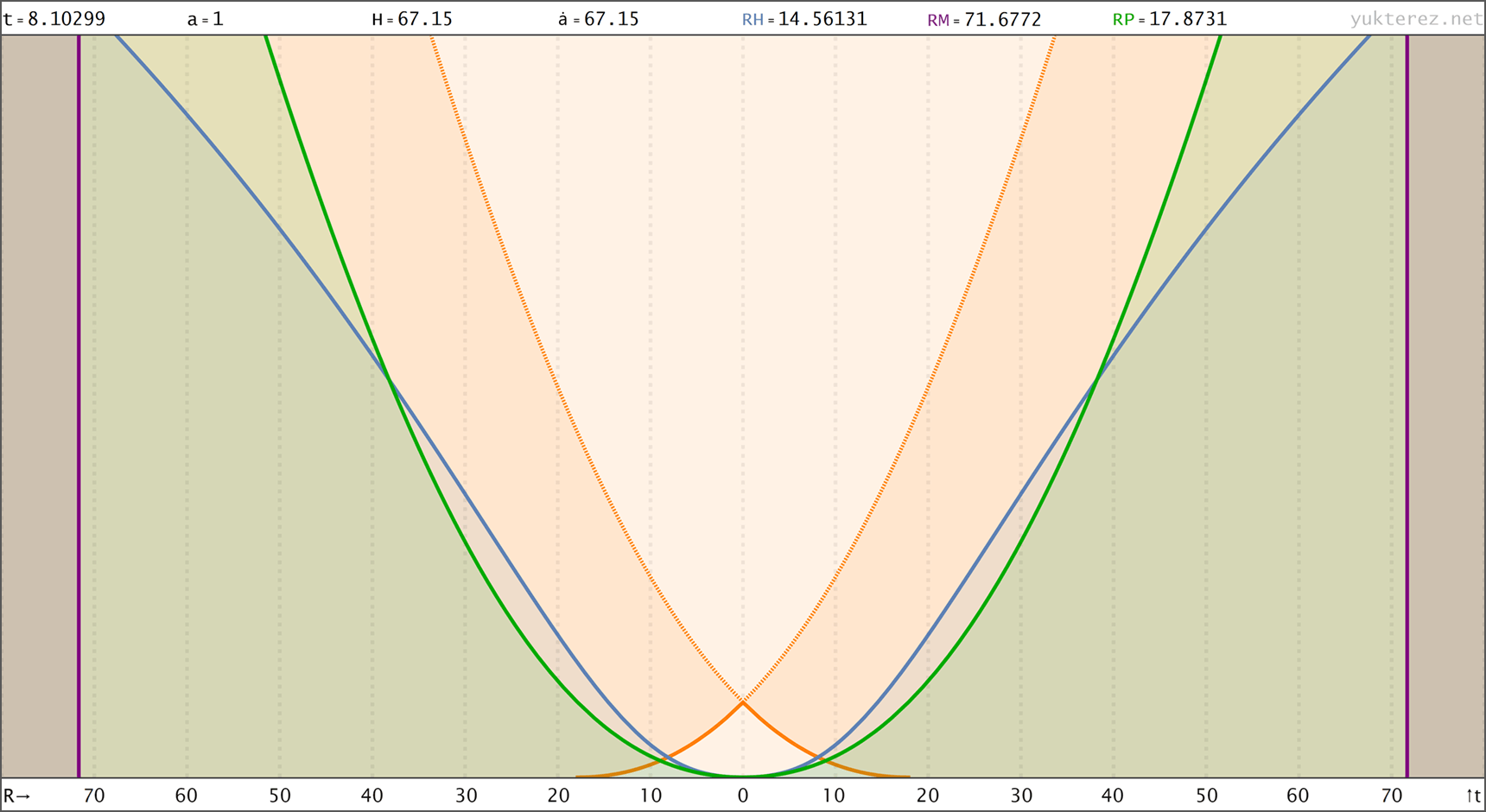
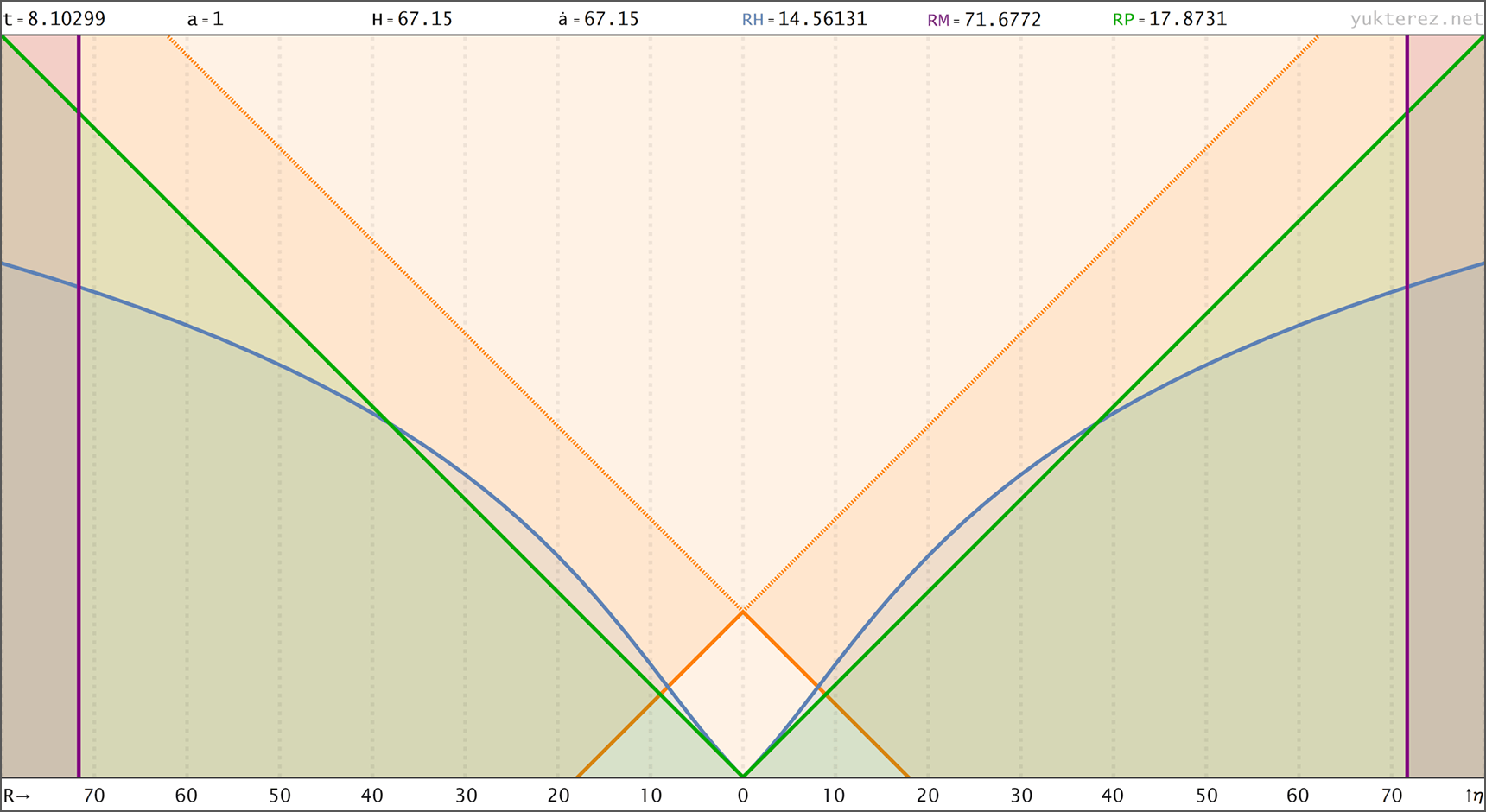
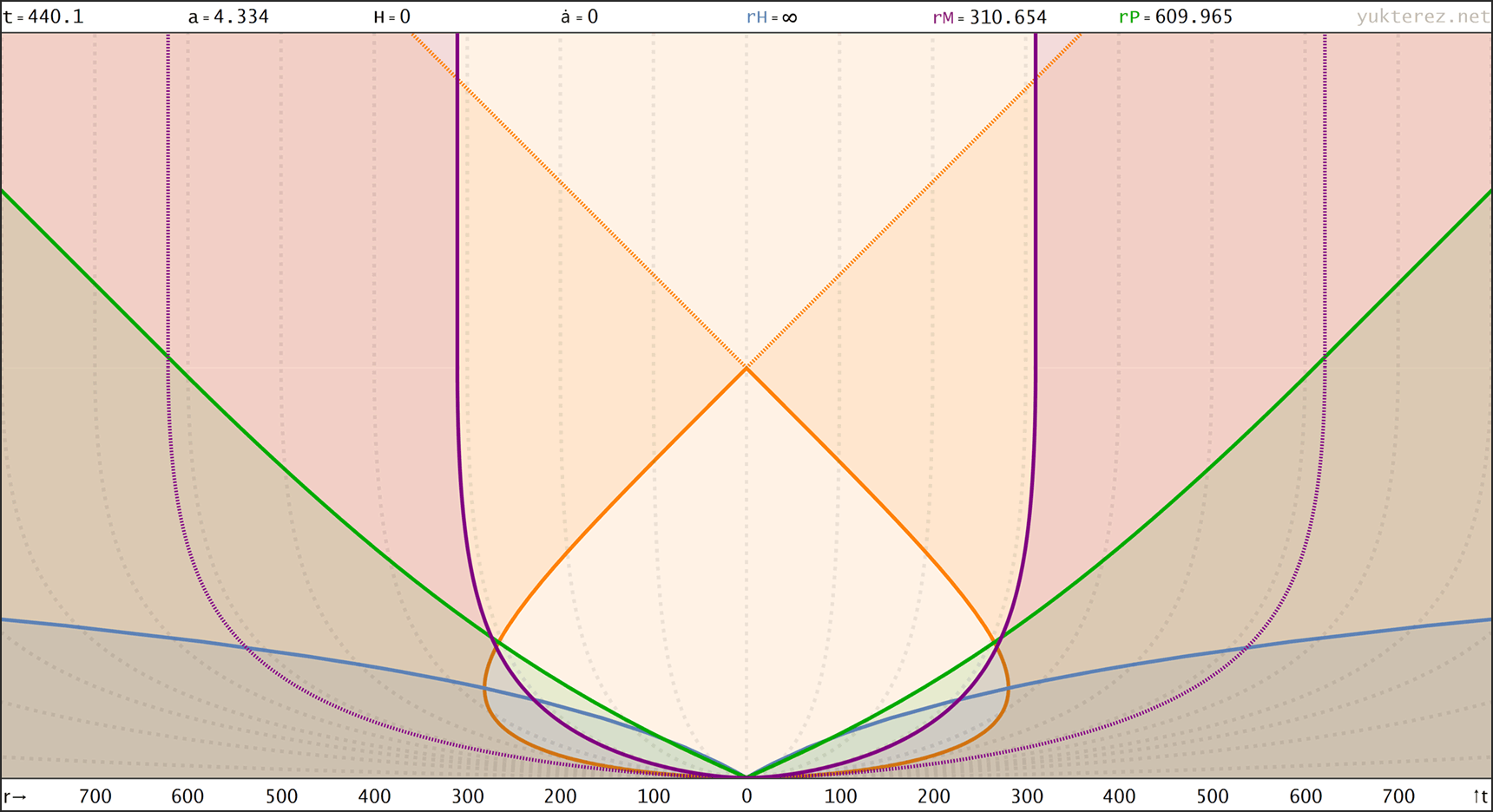
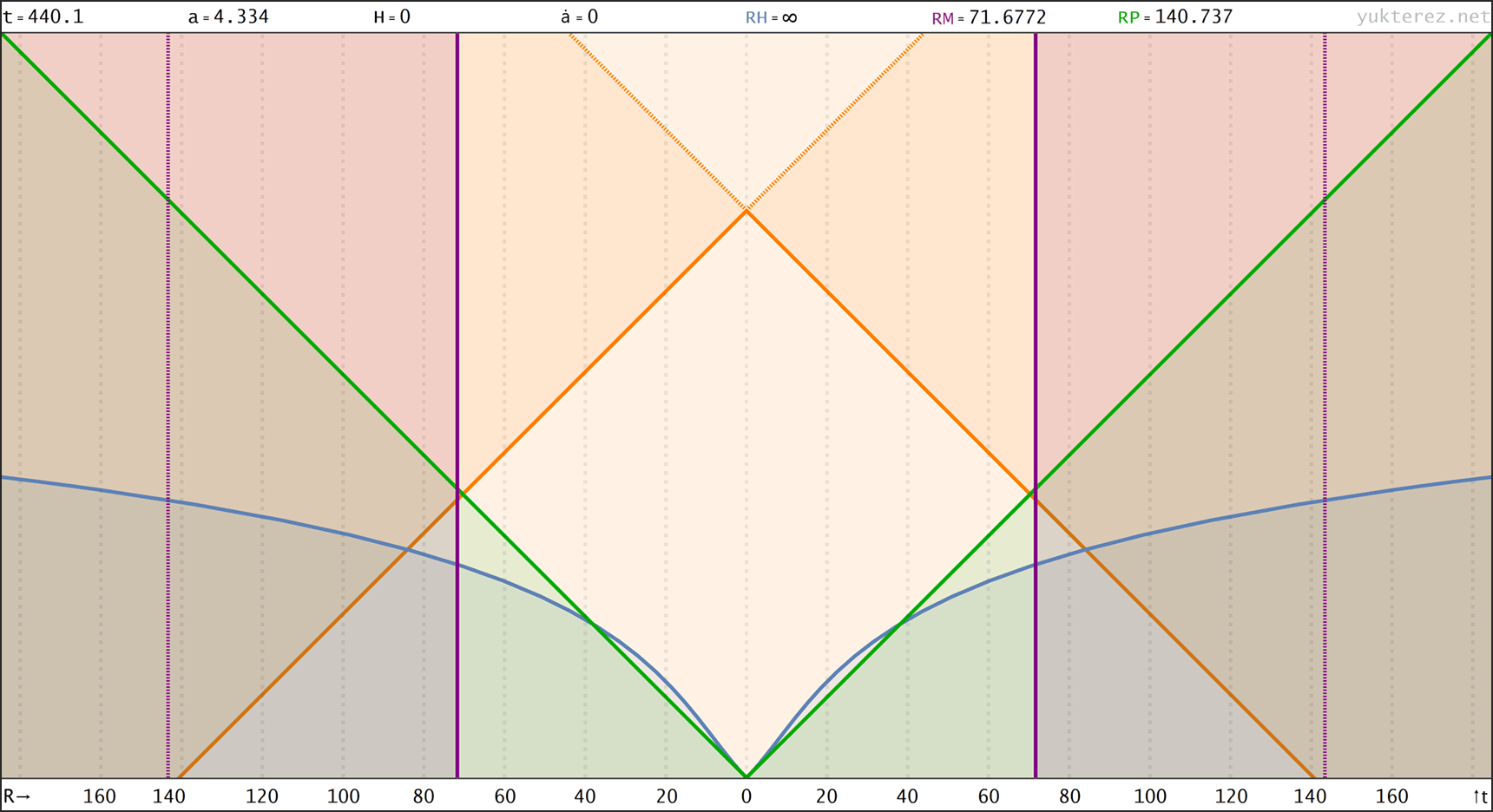
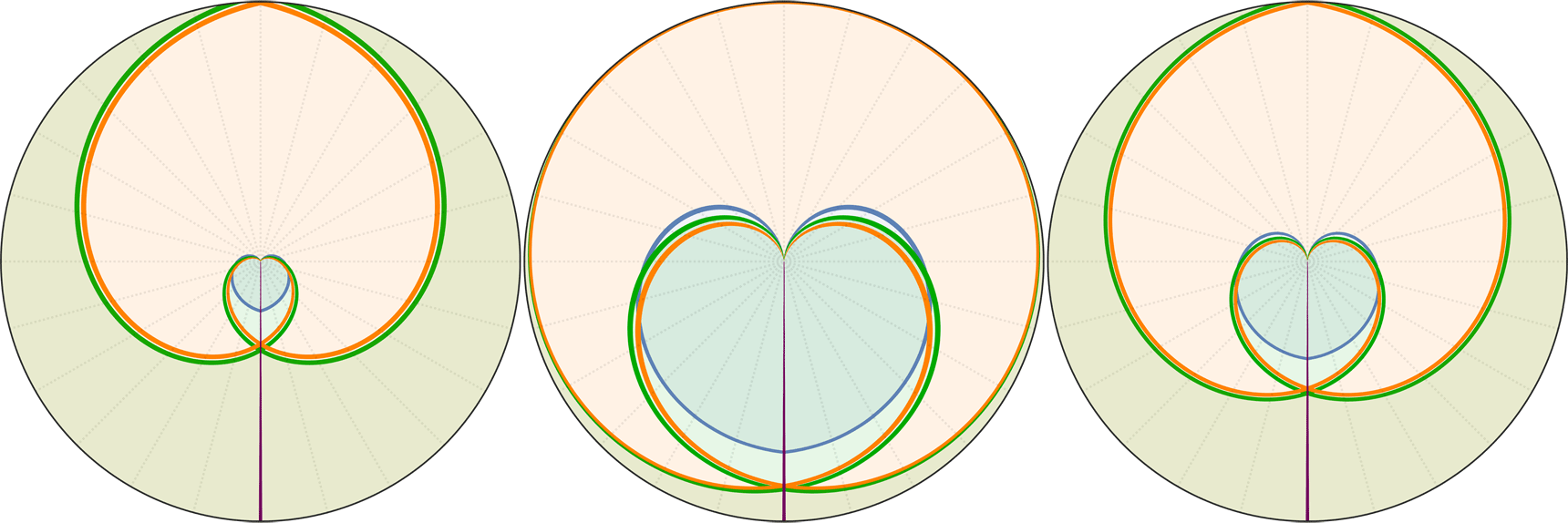
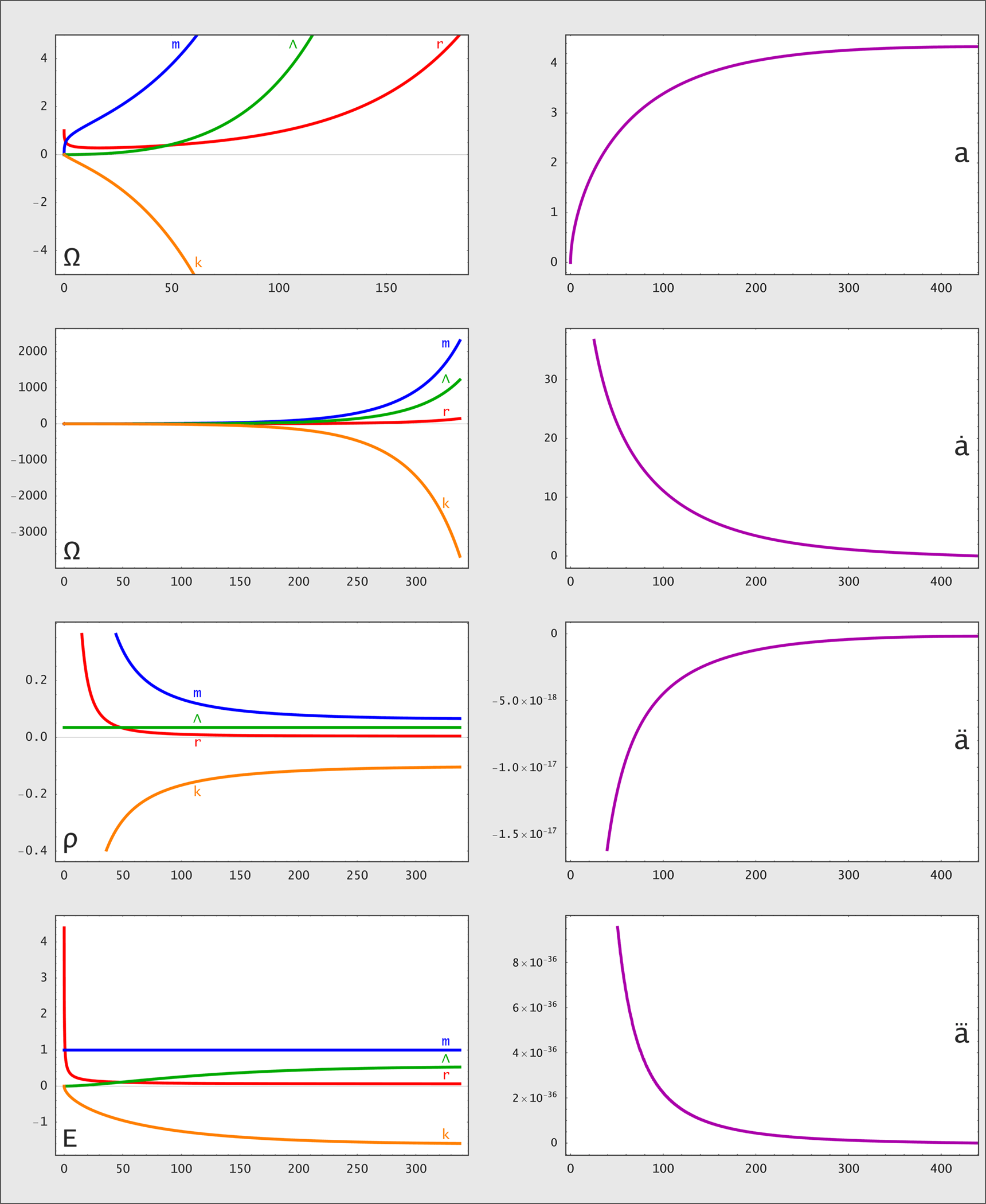
For the closed FLRW metric in hyperspherical and circumferencial coordinates see here.
Code: Alles auswählen
(* | Solver for the critical value of ΩΛ in a closed universe || yukterez.net | *)
Ωk = 1-Ωm-Ωr-ΩΛ;
pr = Ωr/3;
pm = 0;
H² = Ωr/a^4+Ωm/a^3+Ωk/a^2+ΩΛ;
ȧ² = H² a^2;
ä = a (ΩΛ-(Ωm+pm)/a^3/2-(Ωr+pr)/a^4/2);
Ωr = 3/10;
Ωm = 11/10;
f = Reduce[ȧ²==ä==0 && Ωr+Ωm+ΩΛ>1 && Ωr>=0 && Ωm>=0 && ΩΛ>0 && a>1, ΩΛ]
A = N[f[[1,2]]]
ΩΛ = N[f[[2,2]]]/.a->A
plot[x_]:=Plot[x, {a, A-1, A+1}, Frame -> True, GridLines -> {{A}, {}}]
"H²"->plot[H²]
"ȧ²"->plot[ȧ²]
"ä"->plot[ä]
Quit[]Example: at In[1] we define the normalized Hubbleparameter H and the first and second time derivatives (ȧ and ä) of the normalized scalefactor as well as the relations between pressure, density and curvature. At In[5] the velocity and acceleration of the expansion are set to 0 to solve for the limit between expansion and contraction (all the other time derivatives of a also become 0 there). At In[6] we choose our values for the matter Ωm and radiation Ωr. At In/Out[8] we evaluate the required dark energy ΩΛ and the scalefactor a when the equilibrium occurs and plot the functions at Out[11]. The plot values right of the vertical gridline belong to such values of a which are reached at no predictable time t since at the maximal value of a, here a=4.33407, we get H=0 and dH/dt=0, which is an unstable equilibrium:

Spacetime diagrams of the universe above in proper distance r(t), comoving distance R(t) & conformal time R(η) coordinates. rH: Hubble radius (blue), rE: Event horizon (none), rP: Particle horizon (green), rM: Antipode πrK (purple), Orange curve: Past light cone, Dashed orange: Future light cone, Dashed gray: Comoving world lines, R=r/a:

↑ proper, r(t) ◉ ↓ comoving, R(t)

↑ comoving, R(t) ◉ ↓ conformal, R(η)

↑ t = 8.1 Gyr, a = 1 ◉ ↓ t = 440.1 Gyr, a = 4.334

↑ proper, r(t) ◉ ↓ comoving, R(t)

↑ comoving, R(t) ◉ ↓ conformal, R(η)

↑ conformal, R(η) ◉ ↓ polar, R(t)→φ(Я) & R(a)→φ(Я) & R(η)→φ(Я)

↑ spacetime diagrams ◉ ↓ Ω, ρ, E, a, ȧ, ä as functions of t

For the closed FLRW metric in hyperspherical and circumferencial coordinates see here.
Code: Alles auswählen
(* | Evolution of a closed FLRW Universe that reaches an unstable equilibrium | *)
set = {"GlobalAdaptive", "MaxErrorIncreases"->100,
Method->"GaussKronrodRule"}; (* Integration Rule *)
n = 100; (* Recursion Depth *)
int[f_, {x_, xmin_, xmax_}] := (* Integral *)
NIntegrate[f, {x, xmin, xmax},
Method->set, MaxRecursion->n, WorkingPrecision->wp];
wp = MachinePrecision; (* Working Precision *)
im = 200; (* Image Size *)
ηmax = 800; pmax = 800; (* Plot Range *)
amax = Root[4+11#-10#^2-33#^3+8#^4&, 2, 0]; (* Maximal Scale Factor *)
tmax = 444 Gyr; (* Integration Limit *)
c = 299792458 m/sek; (* Lightspeed *)
G = 667384*^-16 m^3 kg^-1 sek^-2; (* Newton Constant *)
Gyr = 10^7*36525*24*3600 sek; (* Billion Years *)
Glyr = Gyr*c; (* Billion Lightyears *)
Mpc = 30856775777948584200000 m; (* Megaparsec *)
ρc[H_] := 3H^2/8/π/G; (* Critical Density *)
ρΛ = ρc[H0] ΩΛ; (* Dark Energy Density *)
kg = m = sek = 1; (* SI Units *)
ΩR = 3/10; (* Radiation Proportion including Neutrinos *)
ΩM = 11/10; (* Matter Proportion including Dark Matter *)
ΩΛ = 3/32+(77 Root[4+11#-10#^2-33#^3+8#^4&, 2, 0])/16+
(203 Root[4+11#-10#^2-33#^3+8#^4&, 2, 0]^2)/160-
(11 Root[4+11#-10#^2-33#^3+8#^4&, 2, 0]^3)/20; (* Dark Energy Proportion *)
ΩT = ΩR+ΩM+ΩΛ; (* Total Density over Critical Density *)
ΩK = 1-ΩT; (* Curvature Density *)
rK = c/H0/Sqrt[-ΩK]; (* Curvature Radius *)
H0 = 67150 m/Mpc/sek; (* Hubble Constant *)
H[a_] := H0 Sqrt[ΩR/a^4+ΩM/a^3+ΩK/a^2+ΩΛ] (* Hubble Parameter *)
sol = Quiet[NDSolve[{A'[t]/A[t] == H[A[t]], A[0] == 1*^-15,
WhenEvent[Abs[A[t]] == amax, tMax=t; "StopIntegration"]},
A, {t, 0, tmax},
MaxSteps->∞, WorkingPrecision->wp]];
â[t_] := Evaluate[(A[t]/.sol)[[1]]]; (* Scale Factor a by Time t *)
a[t_] := If[t<tmax, â[t], amax]; If[t>tmax, amax, â[t]]; (* Optimized a of t *)
т[a_] := int[1/A/H[A], {A, 0, a}]; (* Time t by Scale Factor a *)
rP[t_] := a[t] int[c/a[т], {т, 0, t}]; (* Proper Particle Horizon by t *)
rp[a_] := a int[c/A^2/H[A], {A, 0, a}]; (* Proper Particle Horizon by a *)
RP[t_] := int[c/a[т], {т, 0, t}]; (* Comoving Particle Horizon by t *)
Rp[a_] := int[c/A^2/H[A], {A, 0, a}]; (* Comoving Particle Horizon by a *)
rE[t_] := Nothing; (* Proper Event Horizon by t *)
re[a_] := Nothing; (* Proper Event Horizon by a *)
RE[t_] := Nothing; (* Comoving Event Horizon by t *)
Rε[a_] := Nothing; (* Comoving Event Horizon by a *)
rL[t0_, t_] := a[t] int[c/a[т], {т, t, t0}]; (* Proper Light Cone by t *)
rl[a0_, a_] := a int[c/A^2/H[A], {A, a, a0}]; (* Proper Light Cone by a *)
RL[t0_, t_] := int[c/a[т], {т, t, t0}]; (* Comoving Light Cone by t *)
Rl[a0_, a_] := int[c/A^2/H[A], {A, a, a0}]; (* Comoving Light Cone by a *)
rH[t_] := c/H[a[t]]; (* Proper Hubble Radius by t *)
rh[a_] := c/H[a]; (* Proper Hubble Radius by a *)
RH[t_] := c/H[a[t]]/a[t]; (* Comoving Hubble Radius by t *)
Rh[a_] := c/H[a]/a; (* Comoving Hubble Radius by a *)
t0 = Quiet[Re[t/.FindRoot[a[t]-1, {t, 10 Gyr}]]]; ti = t Gyr; τi = τ Gyr;
"t0"->t0/Gyr "Gyr" (* Current Time *)
tmax = Quiet[Re[t/.FindRoot[a[t]-amax, {t, 10 Gyr}]]]; "tmax"->tmax/Gyr "Gyr"
ηH = Quiet[Interpolation[Join[{{0, 0}}, (* Hubble Radius by Conformal Time *)
ParallelTable[
{Rp[amax (Sin[π a/amax/2])^3]/Glyr, Rh[amax (Sin[π a/amax/2])^3]/Glyr},
{a, amax/2/im, amax-amax/2/im, amax/2/im}],
{{amax, Infinity}}, {{2 amax, Infinity}}]]];
rpN = Rp[1]/Glyr;
"PROPER DISTANCES, f(t)"
pt = Quiet[Plot[
{rH[τi]/Glyr, rP[τi]/Glyr, π rK a[τi]/Glyr},
{τ, 0, pmax}, Frame->True, AspectRatio->pmax/pmax,
FrameTicks->None, PlotRange->{{0, pmax}, {0, pmax}},
PlotStyle->{{Thickness[0.005]},
{Darker[Green], Thickness[0.005]},
{Purple, Thickness[0.005]}},
ImageSize->im, Filling->Top,
FillingStyle->Opacity[0.1], ImagePadding->1,
GridLines->{{}, {}}]];
plot1[t_] := Rasterize[Grid[{{Rotate[Quiet[Show[Plot[
{rL[ti, τi]/Glyr, -rL[ti, τi]/Glyr},
{τ, 0, pmax}, Frame->True, AspectRatio->1,
FrameTicks->None, PlotRange->{{0, pmax}, {0, pmax}},
PlotStyle->{{Orange, Thickness[0.005]},
{{Orange, Thickness[0.005]}, Dashed}},
ImageSize->im, Filling->Top,
FillingStyle->Opacity[0.1], ImagePadding->1,
GridLines->{{}, {}}], pt]], 90 Degree]}}]];
Do[Print[plot1[t]], {t, {tmax/Gyr}}]
plot2 = Rasterize[Grid[{{Rotate[Quiet[Plot[
Join[{0}, Table[n a[τ Gyr]/amax,
{n, 100, 800, 100}], {220 a[τ Gyr], 350 a[τ Gyr]}],
{τ, 0, pmax}, Frame->True, AspectRatio->1,
FrameTicks->None, PlotRange->{{0, pmax}, {0, pmax}},
PlotStyle->Table[{Dashing->Large, Thickness[0.005],
Gray}, {n, 1, 100}], ImageSize->im,
ImagePadding->1]], 90 Degree]}}]]
"COMOVING DISTANCES, f(t)"
ct = Quiet[Plot[
{RH[τi]/Glyr, RP[τi]/Glyr, π rK/Glyr},
{τ, 0, pmax}, Frame->True, AspectRatio->1,
FrameTicks->None, PlotRange->{{0, pmax}, {0, pmax/amax}},
PlotStyle->{{Thickness[0.005]},
{Darker[Green], Thickness[0.005]},
{Purple, Thickness[0.005]}},
ImageSize->im, Filling->Top,
FillingStyle->Opacity[0.1], ImagePadding->1,
GridLines->{{}, {}}]];
plot3[t_] := Rasterize[Grid[{{Rotate[Quiet[Show[Plot[
{RL[ti, τi]/Glyr, -RL[ti, τi]/Glyr},
{τ, 0, pmax}, Frame->True, AspectRatio->1,
FrameTicks->None, PlotRange->{{0, pmax}, {0, pmax/amax}},
PlotStyle->{{Orange, Thickness[0.005]},
{{Orange, Thickness[0.005]}, Dashed}},
ImageSize->im, Filling->Top,
FillingStyle->Opacity[0.1], ImagePadding->1,
GridLines->{{}, {}}], ct]], 90 Degree]}}]];
Do[Print[plot3[t]], {t, {tmax/Gyr}}]
plot4 = Rasterize[Grid[{{Rotate[Quiet[Plot[
Join[{0}, Table[n, {n, 20, pmax, 20}]],
{τ, 0, pmax}, Frame->True, AspectRatio->1,
FrameTicks->None, PlotRange->{{0, pmax}, {0, pmax/amax}},
PlotStyle->Table[{Dashing->Large, Thickness[0.005],
Gray}, {n, 1, 100}], ImageSize->im,
ImagePadding->1]], 90 Degree]}}]]
"CONFORMAL DIAGRAM, f(η)"
cη = Quiet[Plot[
{ηH[Ct], Ct, π rK/Glyr},
{Ct, 0, ηmax/amax}, Frame->True, AspectRatio->1,
FrameTicks->None, PlotRange->{{0, ηmax/amax}, {0, pmax/amax}},
PlotStyle->{{Thickness[0.005]},
{Darker[Green], Thickness[0.005]},
{Purple, Thickness[0.005]}},
ImageSize->im, Filling->Top,
FillingStyle->Opacity[0.1], ImagePadding->1,
GridLines->{{}, {}}]];
plot9[η_] := Rasterize[Grid[{{Rotate[Quiet[Show[Plot[
{η-Ct, Ct-η}, {Ct, 0, ηmax/amax},
Frame->True, AspectRatio->1,
FrameTicks->None, PlotRange->{{0, ηmax/amax}, {0, pmax/amax}},
PlotStyle->{{Orange, Thickness[0.005]},
{{Orange, Thickness[0.005]}, Dashed}},
ImageSize->im, Filling->Top,
FillingStyle->Opacity[0.1], ImagePadding->1,
GridLines->{{}, {}}], cη]], 90 Degree]}}]];
Do[Print[plot9[η]], {η, {RP[tmax]/Glyr}}]
plot10 = Rasterize[Grid[{{Rotate[Quiet[Plot[
Join[{0}, Table[n, {n, 20, pmax, 20}]],
{Ct, 0, ηmax}, Frame->True, AspectRatio->1,
FrameTicks->None, PlotRange->{{0, ηmax/amax}, {0, pmax/amax}},
PlotStyle->Table[{Dashing->Large, Thickness[0.005],
Gray}, {n, 1, 100}], ImageSize->im,
ImagePadding->1]], 90 Degree]}}]]
s[text_] := Style[text, FontFamily->"Lucida Console", FontSize->36]